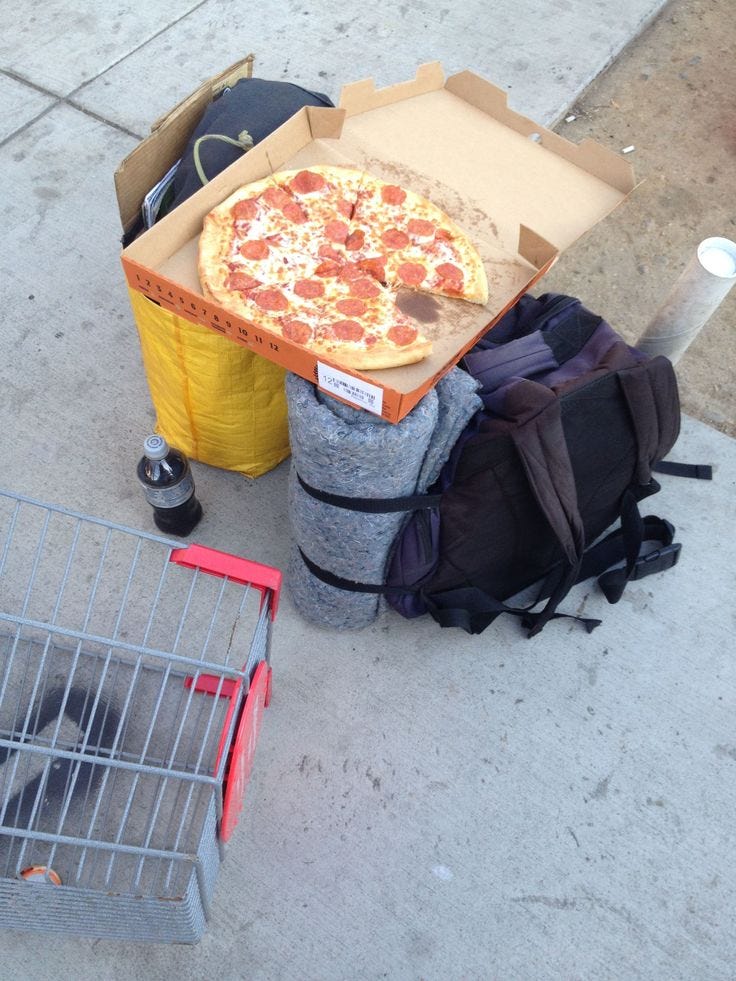Recession 101- Post #1- Welcome to the (not so) wonderful world of recessions
Hey, if you're already out of work, you can't get laid off, right?
Recessions. When the world says, “You’ve been living too high on the hog, now I’m gonna kick your ass for a while.” Street pizza dinner, livin’ large as a homeless guy, 2019. #steveemigphotos
Rewrite- June 14th- 2025- Recessions happen. On average in U.S. history, we’ve had financial recessions every 4 to 7 years. I guess that’s the place to start. But we are not in a typical era in U.S. history. Are we in recession now, as we’re heading into the summer of 2025? Officially, no. But that’s the first issue with recessions, they are never acknowledged when they’re actually happening. The official organization that calls recessions, the NBER, doesn’t tell us we’re in a recession until several months, maybe even a year or more, after it started. Basically, the NBER is useless, at least during a recession.. That’s the first recession lesson. Basically, if nearly everyone seems pretty broke, and most people are worried about losing their job and paying their bills, we’re probably in a recession, or close to it.
What is a recession? It’s a part of the overall economic cycle. During some periods, the total amount of money grows, people feel pretty good off, in general, and “assets” like stocks, home prices, and even collectible items, tend to go up in price. During this part of the cycle, more and more people get more loans for things like houses, cars, business equipment, and the total level of debt in the country grows. Those loans actually increase the total amount of money in the U.S. and the world. But there comes a time when prices overall get a little too high. The growth has run its course, and things start to slow down and begin to contract. By then most people have taken on too much debt, many have trouble paying all their debt payments, and the total amount of money begins to contract. It recedes. That’s when we have a recession. It’s a part of the whole cycle of money and economics, nationwide and worldwide.
Do you NEED MONEY NOW? Click the link. No crazy loan apps, just real ideas
Check out Recession 101- Post #2- 35 legal ways to put cash in your pocket TODAY
Unfortunately, many policy makers now try to keep recessions from happening. They want the stock market and real estate prices to go up forever, but that is just mathematically impossible. So the central banks (like our Federal Reserve, aka The Fed), and politicians, manipulate the economy, to try and keep things positive forever. They try to stretch out the growing up cycle, and keep the down cycle from ever happening. This has been happening in the U.S., and around the world, for decades now. So the last recession, the Great Recession of 2008 (2007-2009, officially), was much worse than most earlier recessions.
Instead of having a “normal” recession in 2012-2016, 4 to 7 years later, like we should have had, the financial manipulations have led a weird, 16 year period that didn’t grow fast, but we didn’t have a real recession, either. We started to go into a recession in early 2020, but then the Covid-19 pandemic led to huge government handouts in the form of stimulus checks, and the PUA, PPP, and similar programs, which buoyed up the economy artificially, from mid 2020 to late 2023. Now… in mid 2025, the recession that should have happened in 2020 finally seems to be taking hold.
Ripped up OBEY (Shephard Fairey) street art poster, Studio City, California, 2021. #steveemigphotos
What does that mean for you?
Debt becomes a huge issue. People who could pay their debts in normal times struggle when their work hours get cut, or they get laid off, and their income drops. As large numbers of people feel the economic pinch, they use up their credit card limits, refinance their homes, and get money from lines of credit to pay bills and buy everyday supplies. They cut back on some frivolous expenses, and the overall economy begins to slow down. Businesses slow down, more people get laid off, and the economy slows down even more. This turns into a negative loop. The total amount of money in the system contracts.
The last full recession, in 2007-2009, was so long ago, that about half of Millennials and all of Gen Z people have not been through a recession in their working, adult life. This financial downturn is new to millions of American adults. The important things are to keep working. Avoid getting laid off. Work harder than your co-workers. Pay off debts that you can pay off quickly. Think about trading in the $80,000 SUV for a $20,000 car you can actually afford for the next two or three years. Pay down the credit card balances if possible, or get a lower interest loan to pay them off, then pay that down at a much lower interest rate. Keep working. Reduce debts. Figure out which parts of your lifestyle you can dial back, to save money. Taxes, rent or mortgage, debt payments, these are some of the biggest expenses for most people. See if you can reduce some of these.
The other option is to earn more money, at a time when it’s harder to find a traditional job. Can you get education or take training of some sort to find a higher paying job. Can you get a side gig? Can you start a small business to earn extra money, either online, or providing some goods or services in your local area? Recessions force most people to reassess their lives, to figure out what’s truly important, and what are unneeded expenses. People who do get laid off have to find other sources of income, cheaper housing situations, and figure out how to pay their debts. Lots of individuals and businesses go bankrupt. These are the big, overall trends happening in recessions.
Cash is king during recessions. Real estate prices usually go down in most areas. Stocks and other investments trend down, at least for a while. But there are so many people selling off houses, businesses, and personal items, from sports cards and Star Wars collectibles to furniture and cars and trucks, that people with cash can get great deals during recessions.
Generally speaking, a few businesses usually do well during recessions. Thrift stores and second hand stores generally do well. People buy more used clothes and items and less new ones. Repair businesses, people who fix phones, computers, cars, and major appliances, usually do well. More people get large, expensive items fixed during recessions, rather than buy new items. Some forms of entertainment do well. In decades past, movie theaters did well in recessions, because they were cheap ways to escape everyday life. These days, movie theaters are expensive, and far fewer people go to them. I think video games, particularly phone and MMRP games, should be pretty strong in this recession.
For all the bad parts of recessions, there are a lot more big opportunities during recessions as well. So here we are, in mid 2025, and it sure feels like a recession. We’re probably in a recession, that will become official in a year or two. They happen. It’s a good time to look at your lifestyle, look at your finances, and think about what your priorities are in life, and where changes make sense.
In the rest of this Recession 101 series of posts, I’ll go into tips I’ve learned from previous recessions, and tell stories of how we dealt with different issues in the broke years of the past. Us aging Generation X people got hit by the long, early 1990’s recession in our 20’s, like Gen Z is getting hit now. We get it. Stay tuned for more recession tips, ways to make a little extra money, save money, and live cheap, in future posts.
Recession 101- Post #2- 35 legal ways to put cash in your pocket today
There are no paid links in this post.






